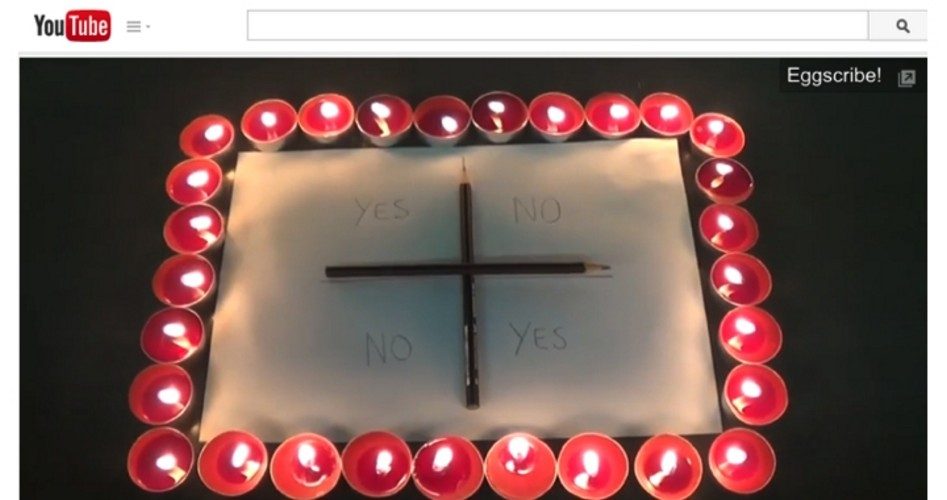
Exorcists are warning about the dangers of a game known as Charlie Charlie that has gone viral on social media during the past week. Popular among teens and young adults, the game involves summoning a spirit named Charlie — also spelled Charly — to answer a series of yes/no questions. Twitter reports more than two million tweets of the hashtag #CharlieCharlieChallenge in less than a week, and players have posted scores of video clips of their results online.
“I want to remind you all there is no such thing as ‘innocently playing with demons,'” writes Father Stephen McCarthy in an open letter to his students at Saints John Neumann and Maria Goretti Catholic High School in Philadelphia, Pennsylvania, as reported by the Independent. “The problem with opening yourself up to demonic activity is that it opens a window of possibilities which is not easily closed,” cautions McCarthy. “Please be sure to NOT participate and encourage others to avoid participation as well.”
The Washington Post states that the likely origin of the craze is a popular playground version of the game in Spain. Called “Juego de la Lapicera” — roughly translated as “play with pens” — it’s known as the poor man’s Ouija board. Players draw a grid, dividing a piece of paper into four quadrants and labeling two of the quadrants “yes” and the other two “no.” They place a pen or pencil over each axis of the grid, overlapping them in the middle. The next step is to ask a series of questions beginning with “Charlie, Charlie can we play?” or “Charlie, Charlie are you here?” The pens move, apparently on their own, in answer to the questions.
Spanish priest and exorcist Father Jose Antonio Fortea told the Catholic News Agency this is a classic case of the occult practice of “calling on spirits.” In a May 27 interview, Fortea said some who play the game will continue to be harassed by “spirits who are at the root of that practice” and “who will stay around for a while.” He cautioned that though players are unlikely to become possessed, they nonetheless run a great risk of the lesser known form of diabolical molestation known as demonic obsession. (In the case of possession, an evil spirit assumes control of a person from within, whereas demonic obsession involves a devil externally attacking or harassing a person, according to demonologist and Jesuit John A. Hardon.)
Moreover, Fortea warns, playing the game will open the door for bigger problems ahead. It “will result in other spirits beginning to enter into even more frequent communication,” he relates. “And so then the person really can suffer much worse consequences from the demons.”
Many mainstream media accounts, such as the story quoted above from the Washington Post, downplay the danger and ridicule concerns. “It’s always hard to say exactly why these things trend,” reads the article, “but the latest bubble seems to have begun in late April in the Dominican province of Hato Mayor, when a local TV news station broadcast a very alarmist (and unintentionally funny) report about the ‘Satanic’ game overtaking local schools.”
But not everyone is so dismissive. “It’s becoming a pastoral emergency. At the moment the number of disturbances of extraordinary demonic activity is on the rise.” So says Dr. Valter Cascioli, spokesman for the International Association of Exorcists (AIE). He made these comments to the Catholic News Agency (CNA) during AIE’s 12th annual conference in Rome last October, noting the increasing number of Catholic ecclesiastics worldwide petitioning his organization for help.
Cascioli attributes the rise in part to increasing occult activity, specifically blaming Ouija boards and séances. What begins with innocent curiosity and passive participation can end in catastrophe. “It usually starts out of ignorance, superficiality, stupidity or proselytizing, actively participating or just watching,” explains Cascioli. He says demons often trick people into believing they’ve made contact with the souls of deceased loved ones, but “the consequences are always disastrous.” Some results he describes are anxiety, panic attacks, nightmares, suicidal thoughts, acts of self-harm, and in severe cases, demonic possession.
CNA also quotes Father Stephen Doktorczyk of the Diocese of Orange, California. “I have dealt with too many situations involving people who, perhaps innocently, started dabbling in the occult,” he recalls. “They now wish they could go back and undo their prior decision.”




